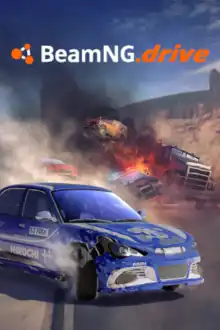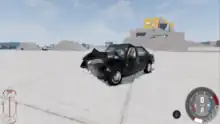| BeamNG.drive | |
|---|---|
 | |
| Developer(s) | BeamNG GmbH |
| Publisher(s) | BeamNG GmbH |
| Designer(s) | Thomas Fischer Lefteris Stamatogiannakis |
| Composer(s) | Gabe "Gabester/Gavril" Fink Mark Knight |
| Engine | Torque 3D |
| Platform(s) | |
| Release | 29 May 2015 (early access) |
| Genre(s) | Vehicle simulation |
| Mode(s) | Single-player, multiplayer |
BeamNG.drive is a vehicle simulation video game developed and published by Bremen-based video game developer BeamNG GmbH. The game features soft-body physics to simulate realistic handling and damage to vehicles.[1][2][3] The game was initially released as a tech demo on 3 August 2013 along with paid access to an alpha, and was later made available on Steam Early Access for Microsoft Windows on 29 May 2015. BeamNG also develops a fork of the game designed for education as well as industrial and academic research entitled BeamNG.tech.[4]
Gameplay
BeamNG.drive features various gameplay modes and scenarios such as campaigns, time trials, as well as a freeroam mode. Campaigns are collections of small scenarios based on specific themes, including races, chases and stunts. In time trials, the player selects a vehicle, map, and route, and competes against their own best time. In free roam, players can explore and experiment with maps, allowing them to operate, place, and manipulate objects and vehicles within the map. They can also change environmental properties such as gravity and wind. Players can utilize various objects ranging from road barriers to weapons such as cannons in order to inflict damage on other vehicles.
BeamNG does not include real vehicle manufacturers, however, included vehicles resemble various real-life vehicles, such as ETK resembling BMW or Gavril resembling Ford. With the use of mods, real cars could be added. In-game brands and vehicles have fictional origin stories attached to them. The vehicle selection is being extended every few releases.
As of alpha release 0.26, the game features an experimental version of a career mode accessed by clicking the main menu button labeled "Career (coming soon)" six times. This gameplay mode features four career progress trackers: Motorsports, Laborer, Specialized, and Adventurer. Completing missions awards the player in-game currency and two types of experience points: Branch EXP, which is experience points gained within specific branches, and Beam EXP, the overall amount of experience points. On September 20, 2023, with the release of update 0.30, the career mode was completely updated - now including a tutorial and uses for the Branch EXP and Beam EXP systems. Starting with 0.30, players may buy cars with an in-game currency called BeamBucks and customize them (both features early in progress).[5] Career saves created 0.26 through 0.29 are incompatible with 0.30 and later.
Physics

BeamNG.drive uses soft-body physics to simulate vehicle dynamics and collisions between objects and vehicles.[2][6][3] Algorithms have been created and optimized for the game's physics system.[7] The game relies heavily on code in Lua, and uses packets of local data using the Lua network system while the game is running. The game's engine calculates physics equations and problems in real-time during gameplay.
Vehicles in the game consist of a soft-body node-beam structure similar to those in Rigs of Rods. Node-beam structures are represented in a JSON-like text file format, called JBeam.[8] The physics engine simulates a network of interconnected nodes and beams, which combine to form an invisible skeleton of a vehicle with realistic weights and masses. In terms of soft-body physics, vehicles realistically flex and deform as stress, such as impacts from collisions, is applied to the skeleton.[9][10] Aside from body deformation, various other types of damage are simulated such as degraded engines, detached doors and shattered windows. If a vehicle is severely damaged, the engine may fail, rendering the vehicle unusable; additionally, the vehicle will also fail from overloading the driveshaft, clutch, and other important components that can result in catastrophic failure to the vehicle. Tires can be blown out and fuel tanks may explode after an excessive number of collisions or due to a direct hit to the rear of the vehicle.
Customization
BeamNG.drive has native modding support, and mods can be installed from an officially maintained mod repository which can be accessed both from the website and within the game itself. The mod manager automatically checks for updates and partially manages dependencies.[11] The mod repository's policies prohibit the modification of core game files.[12] The game also accepts mods from outside the repository, however such mods do not get automatically updated by the game mod manager.
Development
In 2011, some Rigs of Rods developers gathered and decided to improve upon the open-source software with a new product.[13] BeamNG opened its website, beamng.com, on 8 May 2012 to deliver news of the game's development.[14] On 28 May 2012, BeamNG released a YouTube video entitled "Revolutionary soft-body physics in CryEngine3" that featured the vehicle deformation technology. The video, according to Marketing and Communications manager Nataliia Dmytriievska, got over one million views overnight.[13][9] Originally, BeamNG.drive was to be based on CryEngine 3, but its use in a driving game uncovered numerous bugs, leading development to be rolled over to Torque 3D.[15]
A free tech demo was released on 3 August 2013 along with paid access to an alpha test through FastSpring. The tech demo featured only one vehicle and one map, while the alpha test contained five vehicles and six maps.[16][2][17] On 10 September 2013, BeamNG’s sixth vehicle, the Bruckell Moonhawk, was released with YouTube premiere. The game was placed on an open vote on Steam Greenlight on 12 February 2014[18] and was greenlit eight days later.[19] On 29 May 2015, the game was released to Steam Early Access.[20]
On 15 June 2018, BeamNG announced a partnership with Camshaft Software, developers of Automation, revealing the addition of an exporter feature that allows players to export vehicles made within Automation as fully drivable vehicles in BeamNG.drive.[21]
On 25 April 2022, BeamNG announced they were ceasing development of the 32-bit branch as of alpha release 0.25. They stated that less than 0.5% of players were using the 32-bit version and that the decision will speed up the game's development and allow the developers to take full advantage of newer technologies.[22] The latest 32-bit public release branch is 0.23.5.2.[lower-alpha 1]
In June 2022, BeamNG announced experimental support for Linux with version 0.25.[23][24][25]
Reception
Jack Stewart of BBC mentioned that BeamNG.drive "has received interest from the film industry to model vehicle stunts so that they can be prototyped and tested exhaustively – but cheaply – before a stunt driver smashes up a car on set."[3] Polygon's Nick Robinson lauded the game's simulated physics and user-created content support, leading him to create a 38 episode video series for Polygon, "Car Boys", in which he and Griffin McElroy spotlighted new BeamNG.drive content each week.[26][27] Automobile magazine praised the game for its diverse selection of vehicles and its realistic crash physics, saying that "the IIHS has nothing on BeamNG.drive."[28] As of January 2024, BeamNG.Drive was ranked 27th on the list of the highest-rated Steam games, with 97% of its Steam reviews being positive.[29]
Notes
- ↑ Fetched from Steam beta branch data.
References
- ↑ "BeamNG.drive – BeamNG". Archived from the original on 19 October 2021. Retrieved 21 October 2019.
- 1 2 3 Reilly, Luke (8 August 2013). "Finally, BeamNG's Soft-Body Physics Are Available to the Public". IGN. IGN Entertainment. Archived from the original on 20 December 2016. Retrieved 3 December 2016.
- 1 2 3 Stewart, Jack (3 July 2014). "Video-game wrecks get real". BBC. Archived from the original on 26 December 2016. Retrieved 3 December 2016.
- ↑ Maul, Pascale; Mueller, Marc; Enkler, Fabian; Pigova, Eva; Fischer, Thomas; Stamatogiannakis, Lefteris (21 June 2021). BeamNG.tech Technical Paper (PDF). BeamNG.tech (Technical report). Bremen, Germany: BeamNG GmbH. Retrieved 17 January 2024.
- ↑ McGregor, Ross (28 September 2022). "BeamNG.drive's secret career mode: How to play and first impressions". Traxion.gg. Archived from the original on 26 December 2022. Retrieved 26 December 2022.
- ↑ Futter, Mike (5 August 2013). "BeamNG's Amazingly Realistic Car Crashes". Game Informer. GameStop. Archived from the original on 23 March 2017. Retrieved 3 December 2016.
- ↑ Stamatogiannakis, Lefteris (12 June 2014). "A faster selection algorithm". BeamNG. Archived from the original on 10 June 2021. Retrieved 3 December 2016.
- ↑ "JBeam - BeamNG". wiki.beamng.com. Retrieved 8 November 2023.
JBeam is the file format that defines the physics skeleton in the BeamNG engine. It is called JBeam as it is based on JSON (with some exceptions) in order to define node/beam constructs. ... We modified the JSON parser a bit to make the life of the vehicle authors easier:
- 1 2 McGregor, Ross (13 December 2021). "How BeamNG.drive came to be". Traxion.gg. Archived from the original on 2 January 2023. Retrieved 2 January 2023.
- ↑ Fischer, Thomas (5 August 2013). "BeamNG DRIVE alpha release". GarageGames. Archived from the original on 24 September 2015. Retrieved 3 December 2016.
- ↑ McGregor, Ross (27 April 2023). "How to install mods in BeamNG.drive". Traxion.gg. Archived from the original on 6 June 2023. Retrieved 14 December 2023.
- ↑ "Modding Guidelines". www.beamng.com. Retrieved 12 November 2023.
- 1 2 Reilly, Luke (1 October 2012). "The Most Impressive Physics Engine You've Never Seen". IGN. Archived from the original on 5 November 2019. Retrieved 10 October 2022.
- ↑ "new website". BeamNG. 8 May 2012. Archived from the original on 20 December 2016. Retrieved 3 December 2016.
- ↑ "BeamNG and Torque3D". BeamNG. 27 January 2013. Archived from the original on 20 December 2016. Retrieved 3 December 2016.
- ↑ "Alpha Changelog - BeamNG". Archived from the original on 4 November 2020. Retrieved 10 July 2020.
- ↑ BeamNG GmbH. "BeamNG Store". FastSpring. Archived from the original on 9 August 2013. Retrieved 2 November 2022.
- ↑ Savage, Phil (13 February 2014). "BeamNG.drive crashes onto Steam Greenlight". PC Gamer. Future US. Archived from the original on 2 June 2016. Retrieved 3 December 2016.
- ↑ "We have been greenlit!". BeamNG. 20 February 2014. Archived from the original on 20 December 2016. Retrieved 3 December 2016.
- ↑ "Steam Early Access release". BeamNG. 27 May 2015. Archived from the original on 1 September 2016. Retrieved 3 December 2016.
- ↑ "Announcing Automation & BeamNG.drive collaboration!". BeamNG. 15 June 2018. Archived from the original on 20 August 2018. Retrieved 19 September 2018.
- ↑ Adams, Robert (25 April 2022). "BeamNG.drive Ending Support for 32-bit Client". TechRaptor. Archived from the original on 2 October 2022. Retrieved 2 October 2022.
- ↑ "Experimental Linux Support". www.beamng.com. 15 June 2022. Archived from the original on 15 June 2022. Retrieved 10 July 2023.
- ↑ "BeamNG.drive v0.25 Release Notes". www.beamng.com. 15 June 2022. Retrieved 12 August 2023.
- ↑ "BeamNG.drive gets experimental Native Linux support". GamingOnLinux. 15 June 2022. Retrieved 12 August 2023.
- ↑ Feldman, Brian. "Car Boys, the Hilarious and Terrifying Car-Crash Series, Is the Best Show". Archived from the original on 23 December 2016. Retrieved 22 May 2017.
- ↑ Orlove, Raphael (23 September 2016). "There Is Only One YouTube Channel Worth Watching And It's Car Boys". Archived from the original on 15 September 2022. Retrieved 22 May 2017.
- ↑ Gold, Aaron (26 June 2020). "BeamNG.drive: The Driving Simulator For the Rest of Us". Automobile. Archived from the original on 10 December 2020. Retrieved 17 December 2020.
- ↑ "Top 250 best Steam Games". Steam 250. Retrieved 24 January 2023.